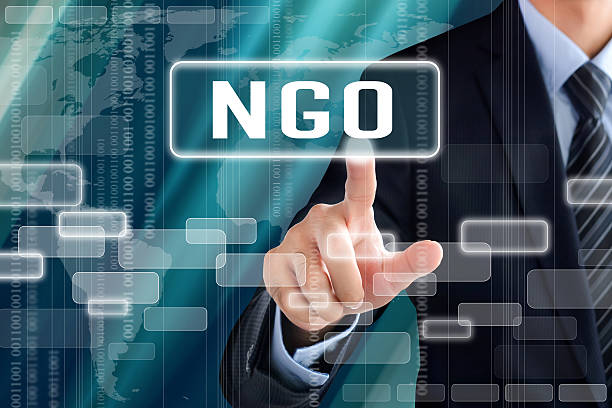NGO Registration
Overview
A Non-Governmental Organization (NGO) is an organization that works independently from the government. It is not influenced or controlled by government authorities and does not engage in political activities. NGOs are typically created by individuals who want to bring about positive social change. They gather financial support from various donors and focus on fulfilling their objectives. NGOs can operate at different levels, such as local, national, or global. The NGO Affairs Bureau, sometimes known as the “NGOAB,” was founded in 1990 with the responsibility of registering and overseeing all NGOs and INGOs that use foreign funding in Bangladesh.

NGO programs typically include:
Human Rights, Woman Rights, Humanitarian Situation, Health issue, Education, Responding to health crises, Environmental issues, Economic programs, Skills development, Local development, Social issues, Religious perspective (support and help), Research and others.
Register Non-Profit Organizations in Bangladesh
Registering a non-profit organization in Bangladesh can be complicated. It requires careful attention to details and following the necessary laws and regulations. The process includes getting government approval, registering with the proper authorities, setting up a board of directors, and completing other required steps. Proper planning, research, and preparation are essential for a smooth registration process.
In Bangladesh, there are five ways to register an NGO:
- Registering Under NGO Affairs Bureau
- Registering Under Microcredit Regulatory Authority (MRA)
- Registering Under the Department of Social Services (DSS)
- Registering Under the Department of Women’s Affairs (DWA)
- Registration of NGOs through RJSC in Bangladesh
Process of Registration Under NGO Affairs Bureau:
An international organization registered outside Bangladesh must be registered with the NGO Affairs Bureau (NGOAB) before operating in the country. Additionally, any international NGO or charity must be registered with NGOAB to receive donations from foreign organizations or institutions.
Relevant Law: Foreign Donations (Voluntary Activities) Regulations Act, 2016 (FDRA)
Steps of Registration:
Step 01: Application to the NGOAB
Step 02: Follow the prescribed format, namely ‘FD -1 Form’
Step 03: Submission of Necessary documents with FD-1 Form
Step 04: Payment of government fees, i.e. Treasury challan, VAT etc.
Step 05: Application forwarded to Ministries
Step 06: Security Check by the Law enforcement agency, i.e. Special Branch of Police and National Security Intelligence etc.
Step 07: Inspection, Monitoring and Review of the NGO by the Ministry
Step 08: Review and final scrutiny by the NGOAB and if satisfied then issuance of a letter of registration to operate in Bangladesh.
Step 09: Timeframe for the Registration process is officially stated that 90 working days but in practice, the entire procedure may take 6-7 months.
A time limit of Registration and Renewal:
The operational permit for an International NGO is for the next 10 years but the documents must be resubmitted within 6 months prior to the end of that 10 years to renew the time for operation in Bangladesh.
Microcredit Regulatory Authority (MRA) – Licensing Process
The Microcredit Regulatory Authority (MRA) is the central regulatory body responsible for promoting, regulating, monitoring, and supervising the microfinance sector in Bangladesh. It ensures that microfinance operations run smoothly and transparently under a well-structured legal framework.
According to the Microfinance Regulatory Act, 2006, only duly registered organizations can apply for a license to operate a microcredit program. Eligible organizations include those registered under: Societies Registration Act, 1860, The Trust Act, 1882, Voluntary Social, Welfare Agencies (Registration and Control) Ordinance, 1961, Cooperative Societies Act, 2001, Company Act, 1994.
Relevant Laws & Regulations:
Microfinance Regulatory Act, 2006
Microcredit Regulatory Rules, 2010
Step-by-Step Process of Registration:
Step 1: Application Submission
The organization must apply for a microfinance license using the prescribed application form, known as Annexure A. This form must be filled out accurately with all required details.
Step 2: Submission of Required Documents
The applicant must submit necessary supporting documents along with Annexure A. These documents typically include:
- Registration certificate under the relevant act
- Organization’s constitution or memorandum of association
- Details of the organization’s financial activities
- List of governing body members
- Audit reports and financial statements
Step 3: Evaluation & Payment of License Fee
Once the application and documents are submitted, MRA will review and evaluate the information provided. If the authority is satisfied with the details, they will issue a formal request to the applicant for payment of the prescribed license fee.
Step 4: License Issuance or Rejection
After receiving the license fee, MRA will issue the microfinance license, allowing the organization to legally conduct microcredit operations.
If the application does not meet the required criteria, the authority will reject it and notify the applicant in writing within 30 days.
Importance of the Licensing Process
Obtaining a license from MRA is mandatory for organizations wishing to conduct microfinance operations in Bangladesh. This process ensures transparency, regulatory compliance, and accountability, ultimately protecting the interests of both microfinance institutions and borrowers.
Process of Registration Under the Department of Social Services (DSS):
An NGO or charity can be registered with the Department of Social Services (DSS) under the Ministry of Social Welfare. However, only organizations that provide welfare services to specific groups can apply. These include children, youth, women, families, people with physical or mental disabilities, and those in need of family planning, recreation, or civic responsibility programs. Organizations helping former prisoners, juvenile offenders, the socially disadvantaged, beggars, the poor, patients, the elderly, or those involved in social work and welfare coordination are also eligible for registration.
Concerned Laws: The Voluntary Social Welfare Agencies (Registration and Control) Ordinance, 1961 & Rules, 1962.
Steps of Registration:
Step 1: Get Name Clearance: First, you need to get approval for your NGO’s name from the relevant authority. This ensures that the name is not already in use, allowing you to proceed with registration.
Step 2: Fill Out the Registration Form (Form-B): Next, complete the registration form called ‘Form-B.’ Make sure to provide all the necessary details and submit it along with the required documents.
Step 3: Submit Required Documents: Along with the form, you must submit all necessary documents, including proof of your organization’s details and other supporting papers.
Step 4: Pay the Required Fees: You need to pay the government fees, including VAT and Treasury Challans. Ensure that all payments are made correctly and keep the receipts for future reference.
Step 5: Application Sent to Relevant Ministries: Once you submit your application, it will be forwarded to the concerned ministries for further processing.
Step 6: Security Check by Law Enforcement: Law enforcement agencies, such as the National Security Intelligence (NSI) or Special Branch of Police, will conduct a background check to verify your application.
Step 7: Ministry Review: The relevant ministry will then review your application to ensure all requirements are met.
Step 8: Final Review and Approval: Lastly, the Department of Social Services will thoroughly check your documents. If everything is in order, they will approve your registration. This process usually takes about 5 to 7 months.
Process of Registration Under the Department of Women’s Affairs (DWA):
Organizations that aim to work for the welfare of women and children can register under the Department of Women’s Affairs (DWA), which operates under the Ministry of Women & Children Affairs. The organizational structure of DWA is similar to that of the Department of Social Services (DSS).
Relevant Laws & Regulations:
The Voluntary Social Welfare Agencies (Registration and Control) Ordinance, 1961 & Related Rules, 1962
Registration Process:
The registration process under the DWA follows the same steps as the Department of Social Services (DSS) under the Voluntary Social Welfare Agencies (Registration and Control) Ordinance, 1961 & Related Rules, 1962. Organizations must comply with the required documentation and procedures to obtain legal recognition for their welfare activities.
Process of Registration of NGOs through RJSC in Bangladesh
Non-Governmental Organizations (NGOs) and charitable organizations can register with the Bangladesh Registrar of Joint Stock Companies and Firms (RJSC) under the Ministry of Commerce. Most non-profit organizations in Bangladesh operate under this framework due to its broad scope and flexibility, allowing them to engage in a variety of activities.
Relevant Laws & Regulations
- The Societies Registration Act, 1860
- The Companies Act, 1994
Registration Process under the Societies Registration Act, 1860
Organizations involved in literary, scientific, charitable, or similar purposes can form a society by registering with the RJSC. The process involves the following steps:
Step 1: Name Clearance: Obtain name clearance from RJSC to ensure the proposed society name is available.
Step 2: Submission of Application: Submit an application to RJSC along with: Memorandum of Association, Rules and Regulations of the Society, Name Clearance Letter, Other necessary documents as required.
Step 3: Payment of Government Fees: Pay the prescribed government registration fees.
Step 4: Security Verification: Law enforcement agencies such as the Special Branch of Police (SB) and National Security Intelligence (NSI) will conduct a background security check.
Step 5: Inspection & Review: Concerned authorities will inspect, monitor, and review the NGO’s proposed activities and objectives.
Step 6: Issuance of Registration: If the application meets all requirements, RJSC will issue the registration certificate, legally recognizing the organization as a society.
Registration Process under the Companies Act, 1994
Under Section 28 of the Companies Act, 1994, an association can be registered as a non-profit company with limited liability, provided it obtains a license from the Bangladesh Registrar of Joint Stock Companies and Firms (RJSC) under the Ministry of Commerce.
The registration process follows similar steps as mentioned earlier. The government will issue a license only if it is satisfied that the organization aims to promote commerce, art, science, religion, charity, or other beneficial activities. Additionally, the organization must use its profits or income solely for its objectives and cannot distribute dividends to its members.
Such welfare-focused organizations are typically registered as companies limited by guarantee under the Companies Act, 1994.
Once approved, these welfare-oriented companies are incorporated as companies limited by guarantee, allowing them to operate legally as non-profit entities under the Companies Act, 1994.
Conclusion
The growth of NGOs plays a vital role in the development of a country. To successfully register your non-profit organization in Bangladesh, follow the steps outlined above carefully. Even a minor mistake can result in the rejection of your application.
Since the registration process can be complex for those unfamiliar with legal procedures, it is advisable to seek assistance from legal professionals if needed. You can also contact Alam & Associates for expert guidance.
We hope this comprehensive guide helps simplify the registration process for your non-profit organization in Bangladesh.
